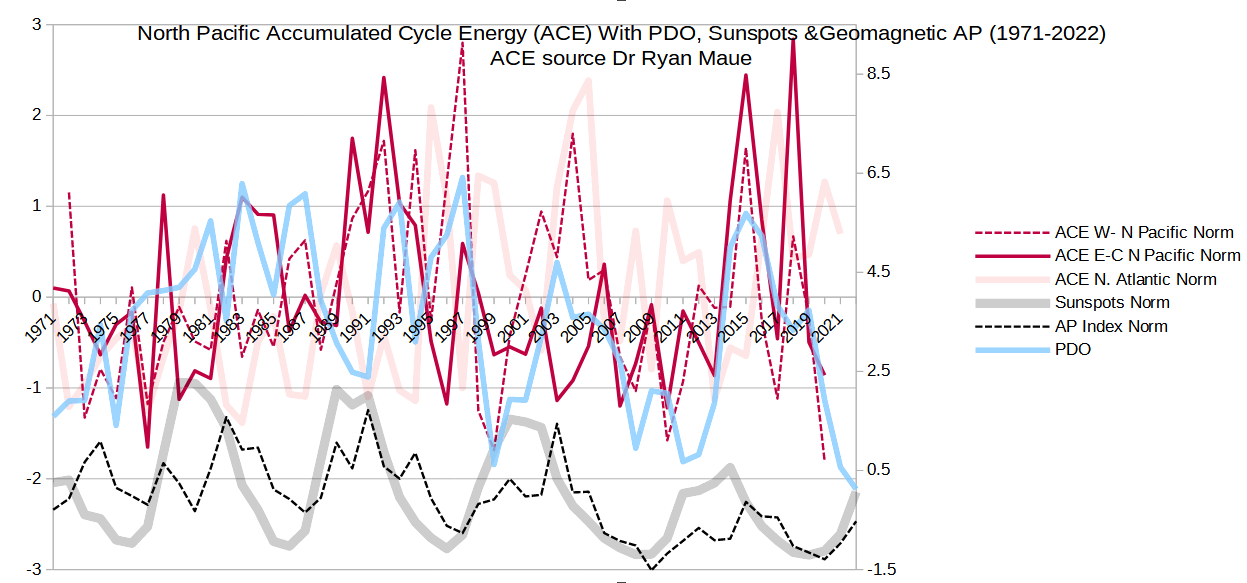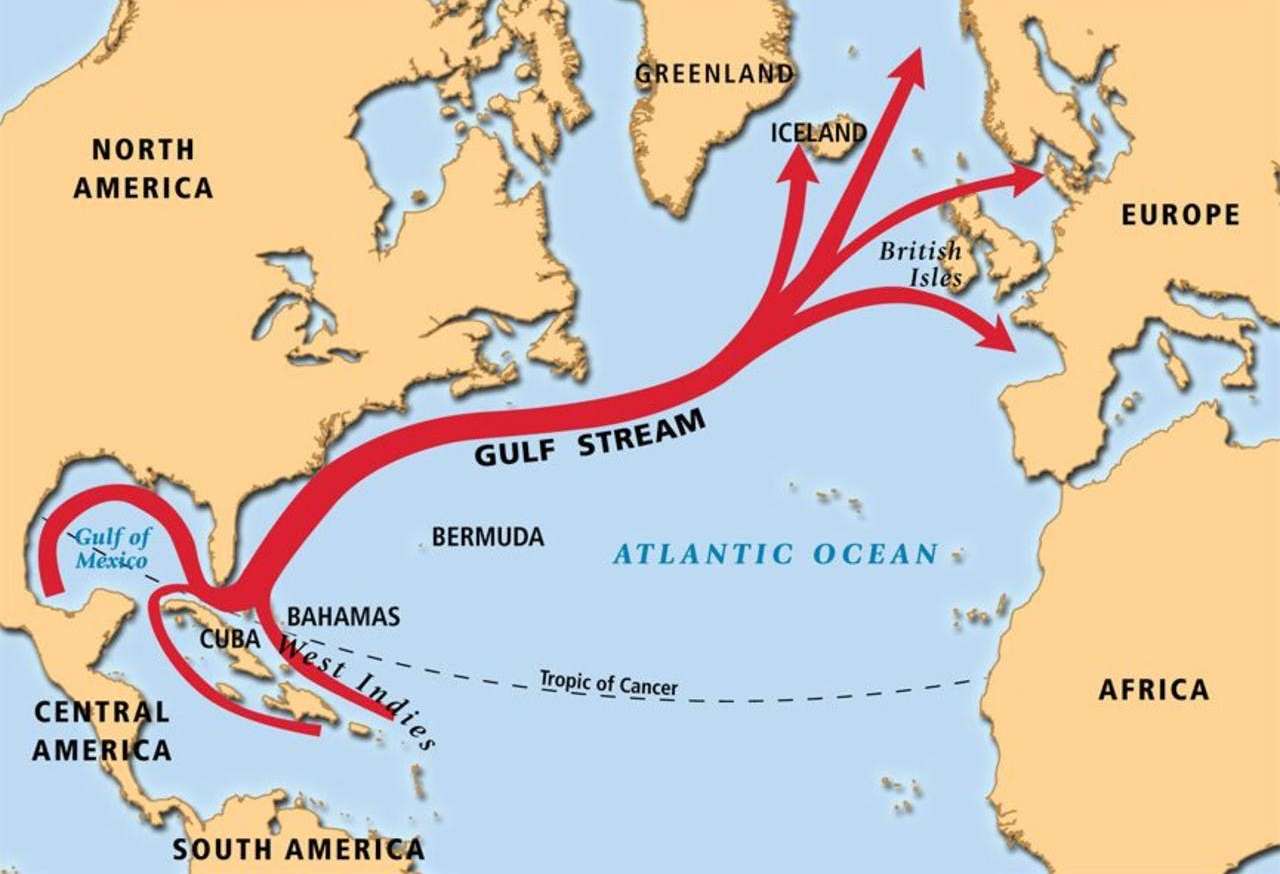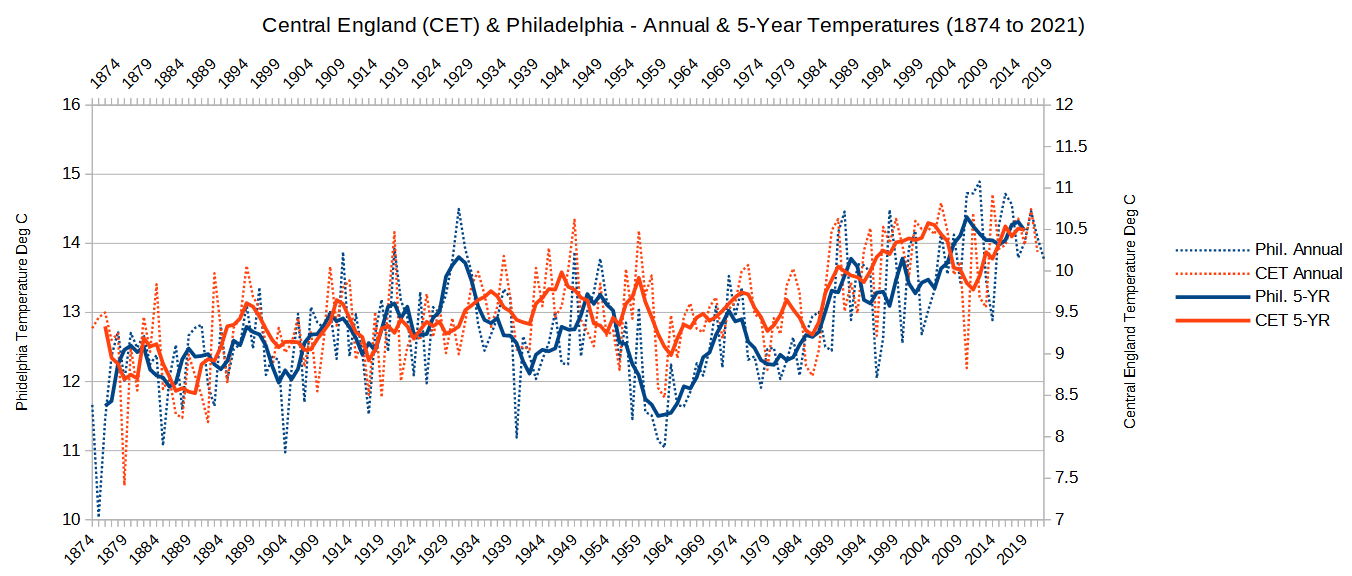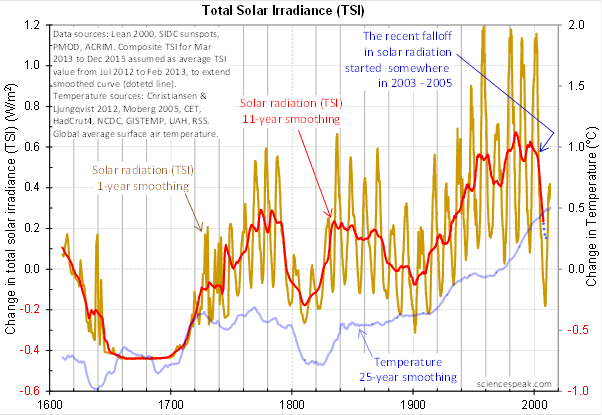|
|
Post by Sigurdur on Jan 31, 2023 17:04:53 GMT
Trying again
|
|
|
|
Post by phydeaux2363 on Jan 31, 2023 18:55:09 GMT
climatlas.com/tropical/ Try Ryan Maue's site, MoBoy. He's a lukewarmer, but keeps great records on tropical cyclones, sorted by Ocean Basins.
|
|
|
|
Post by missouriboy on Jan 31, 2023 19:34:19 GMT
climatlas.com/tropical/ Try Ryan Maue's site, MoBoy. He's a lukewarmer, but keeps great records on tropical cyclones, sorted by Ocean Basins. Thank you Mr Phy. He does indeed and I just grabbed a bunch of databases. Proper attribution of course. |
|
|
|
Post by ratty on Jan 31, 2023 22:22:58 GMT
Damn ... you're good Ratty.  Sig ... your post material doesn't show up. I accept all credit cards, money orders, cash and cheques. PS: Was there anything useful on the site? |
|
|
|
Post by missouriboy on Feb 1, 2023 1:40:24 GMT
ACE for the North Atlantic fits nicely with the AMO. ACE for West North Pacific and the East-Central North Pacific fit nicely with the PDO. Warm water (releasing heat) in the N. Atlantic and in the N-NE Pacific is associated with positive ACE values: more cyclone energy. Positive PDO is also positive ENSO.
 |
|
|
|
Post by duwayne on Feb 4, 2023 20:19:24 GMT
What I am about to cover in this post and 2 more posts which will follow is not a prediction, but a possibility.
The possibility is we might be in for some cool global temperatures ahead.
A few years ago there were some reports noting a slowing of the Atlantic Meridional Overturning Circulation (AMOC). The claim was that certain experts had models which were showing that greenhouse gas warming was causing a slowdown of the AMOC which could tip us into a situation where the circulation would stop and the earth would warm dramatically. They claimed this might occur in the next few decades.
Does this make sense? Could a slowdown in the AMOC cause warming?
For 15 years on this and the predecessor site I have been discussing the significant role of ocean currents on global temperatures. The key isn’t so much the circulation of surface water. If surface water moves without mixing with subsurface water it doesn’t change surface temperatures. It’s the same water.
On the other hand if upwelling and downwelling is involved, there is a significant effect on surface temperatures as cool subsurface water replaces warmer surface water. La Nina is a perfect example of significant cooling from upwelling of cool subsurface water.
The AMOC involves upwelling and downwelling. So what is actually happening with the AMOC? More to follow.
|
|
|
|
Post by missouriboy on Feb 4, 2023 22:26:52 GMT
What I am about to cover in this post and 2 more posts which will follow is not a prediction, but a possibility. The possibility is we might be in for some cool global temperatures ahead. A few years ago there were some reports noting a slowing of the Atlantic Meridional Overturning Circulation (AMOC). The claim was that certain experts had models which were showing that greenhouse gas warming was causing a slowdown of the AMOC which could tip us into a situation where the circulation would stop and the earth would warm dramatically. They claimed this might occur in the next few decades. Does this make sense? Could a slowdown in the AMOC cause warming? For 15 years on this and the predecessor site I have been discussing the significant role of ocean currents on global temperatures. The key isn’t so much the circulation of surface water. If surface water moves without mixing with subsurface water it doesn’t change surface temperatures. It’s the same water. On the other hand if upwelling and downwelling is involved, there is a significant effect on surface temperatures as cool subsurface water replaces warmer surface water. La Nina is a perfect example of significant cooling from upwelling of cool subsurface water. The AMOC involves upwelling and downwelling. So what is actually happening with the AMOC? More to follow. The long-held belief has been that the high-latitude countries of Western Europe owe their relatively mild climate to the NAD. This offshoot of the N. Atlantic gyre releases large quantities of heat through evaporation, becoming more saline and denser in the process. At least part of this flow sinks and returns southward as the overturning circulation (AMOC). Heat will move from hot to cold regardless of medium. I fail to see how a slowdown of the NAD would cause the Earth to warm dramatically. Maybe it's just me. The following article is from a year ago. These people totally ignore the N Atlantic Gyre south and east of about 40 N like it doesn't exist. Nope, not there at all. Malpractice.
 |
|
|
|
Post by acidohm on Feb 4, 2023 22:34:13 GMT
What I am about to cover in this post and 2 more posts which will follow is not a prediction, but a possibility. The possibility is we might be in for some cool global temperatures ahead. A few years ago there were some reports noting a slowing of the Atlantic Meridional Overturning Circulation (AMOC). The claim was that certain experts had models which were showing that greenhouse gas warming was causing a slowdown of the AMOC which could tip us into a situation where the circulation would stop and the earth would warm dramatically. They claimed this might occur in the next few decades. Does this make sense? Could a slowdown in the AMOC cause warming? For 15 years on this and the predecessor site I have been discussing the significant role of ocean currents on global temperatures. The key isn’t so much the circulation of surface water. If surface water moves without mixing with subsurface water it doesn’t change surface temperatures. It’s the same water. On the other hand if upwelling and downwelling is involved, there is a significant effect on surface temperatures as cool subsurface water replaces warmer surface water. La Nina is a perfect example of significant cooling from upwelling of cool subsurface water. The AMOC involves upwelling and downwelling. So what is actually happening with the AMOC? More to follow. The long-held belief has been that the high-latitude countries of Western Europe owe their relatively mild climate to the NAD. This offshoot of the N. Atlantic gyre releases large quantities of heat through evaporation, becoming more saline and denser in the process. At least part of this flow sinks and returns southward as the overturning circulation (AMOC). Heat will move from hot to cold regardless of medium. I fail to see how a slowdown of the NAD would cause the Earth to warm dramatically. Maybe it's just me. The following article is from a year ago. These people totally ignore the N Atlantic Gyre south and east of about 40 N like it doesn't exist. Nope, not there at all. Malpractice.
 How do you view the anomalous warm East Coast these past 10 years? |
|
|
|
Post by missouriboy on Feb 4, 2023 23:28:45 GMT
The long-held belief has been that the high-latitude countries of Western Europe owe their relatively mild climate to the NAD. This offshoot of the N. Atlantic gyre releases large quantities of heat through evaporation, becoming more saline and denser in the process. At least part of this flow sinks and returns southward as the overturning circulation (AMOC). Heat will move from hot to cold regardless of medium. I fail to see how a slowdown of the NAD would cause the Earth to warm dramatically. Maybe it's just me. The following article is from a year ago. These people totally ignore the N Atlantic Gyre south and east of about 40 N like it doesn't exist. Nope, not there at all. Malpractice.
How do you view the anomalous warm East Coast these past 10 years? Has it been? I haven't noticed. The only east coast city I've ever put together a database for was Philadelphia ... because of its very long record. Looks a lot like the CET. Just a little more continental in the cold periods. A Big UHI.
 |
|
|
|
Post by acidohm on Feb 5, 2023 6:27:00 GMT
Ah, sorry, I was thinking about the sea temperature....
|
|
|
|
Post by flearider on Feb 5, 2023 17:54:57 GMT
What I am about to cover in this post and 2 more posts which will follow is not a prediction, but a possibility. The possibility is we might be in for some cool global temperatures ahead. A few years ago there were some reports noting a slowing of the Atlantic Meridional Overturning Circulation (AMOC). The claim was that certain experts had models which were showing that greenhouse gas warming was causing a slowdown of the AMOC which could tip us into a situation where the circulation would stop and the earth would warm dramatically. They claimed this might occur in the next few decades. Does this make sense? Could a slowdown in the AMOC cause warming? For 15 years on this and the predecessor site I have been discussing the significant role of ocean currents on global temperatures. The key isn’t so much the circulation of surface water. If surface water moves without mixing with subsurface water it doesn’t change surface temperatures. It’s the same water. On the other hand if upwelling and downwelling is involved, there is a significant effect on surface temperatures as cool subsurface water replaces warmer surface water. La Nina is a perfect example of significant cooling from upwelling of cool subsurface water. The AMOC involves upwelling and downwelling. So what is actually happening with the AMOC? More to follow. The long-held belief has been that the high-latitude countries of Western Europe owe their relatively mild climate to the NAD. This offshoot of the N. Atlantic gyre releases large quantities of heat through evaporation, becoming more saline and denser in the process. At least part of this flow sinks and returns southward as the overturning circulation (AMOC). Heat will move from hot to cold regardless of medium. I fail to see how a slowdown of the NAD would cause the Earth to warm dramatically. Maybe it's just me. The following article is from a year ago. These people totally ignore the N Atlantic Gyre south and east of about 40 N like it doesn't exist. Nope, not there at all. Malpractice.
 the only way to block the gulf stream is salinity as the caps melt or the gyre releases the gulf stream will drop it's salt early .. thus heat will not move as far north .. creating the first step of an ice age .. |
|
|
|
Post by nonentropic on Feb 6, 2023 4:47:22 GMT
This is a shift from the posts above which are very interesting and counterintuitive. I refound an article I read a few years ago. It relates to the nutrients deposited into the oceans as a consequence of large fires in this case Australia. www.vox.com/down-to-earth/2021/9/15/22672480/wildfires-oceans-algae-blooms-climate-change-australiaThere is a ludicrous hypothesis in the paper I presume to make people in the CAGW narrative happy, that fire will and have risen in frequency. I think its fully understood that forest fires have been reduced massively very especially the frequency and in winter. My belief is that the historical number of fires fertilized the oceans and consequently made the oceans very capable at CO2 sequestration and generally very fish productive. Within the discussion over time is the understanding that during Ice-ages as against an inter glacial as now the dry cold deserts were sources of wind blown Fe fertilization also. So fires could be CO2 neutral globally and offer a permanent sequestration as against the fraudulent forest grown sequestration programs that plague the world, very especially NZ. |
|
|
|
Post by Sigurdur on Feb 6, 2023 13:00:13 GMT
Exactly!!
|
|
|
|
Post by missouriboy on Feb 6, 2023 22:22:30 GMT
Found this in my files (pinched no doubt). Needs about a decade of update. But it's a marvelous graph. Would seem Centennial Minimum.  |
|
|
|
Post by missouriboy on Feb 6, 2023 22:26:03 GMT
This is a shift from the posts above which are very interesting and counterintuitive. I refound an article I read a few years ago. It relates to the nutrients deposited into the oceans as a consequence of large fires in this case Australia. www.vox.com/down-to-earth/2021/9/15/22672480/wildfires-oceans-algae-blooms-climate-change-australiaThere is a ludicrous hypothesis in the paper I presume to make people in the CAGW narrative happy, that fire will and have risen in frequency. I think its fully understood that forest fires have been reduced massively very especially the frequency and in winter. My belief is that the historical number of fires fertilized the oceans and consequently made the oceans very capable at CO2 sequestration and generally very fish productive. Within the discussion over time is the understanding that during Ice-ages as against an inter glacial as now the dry cold deserts were sources of wind blown Fe fertilization also. So fires could be CO2 neutral globally and offer a permanent sequestration as against the fraudulent forest grown sequestration programs that plague the world, very especially NZ. Time for you to get another fireplace and do your patriot duty.  |
|